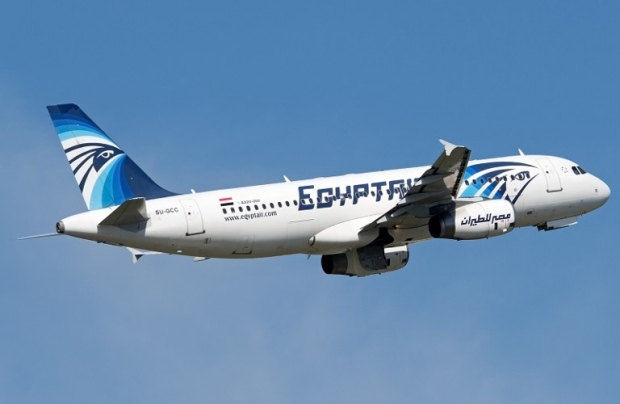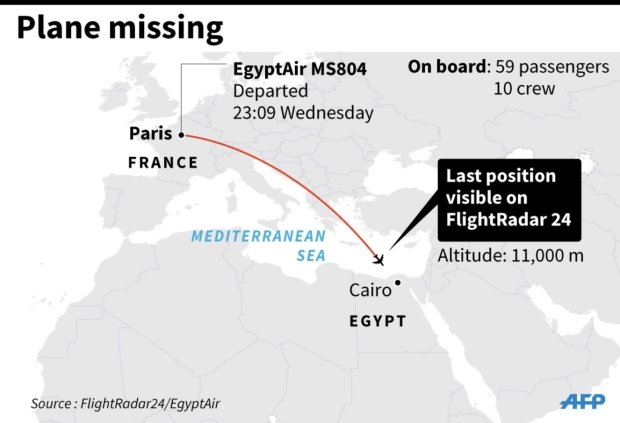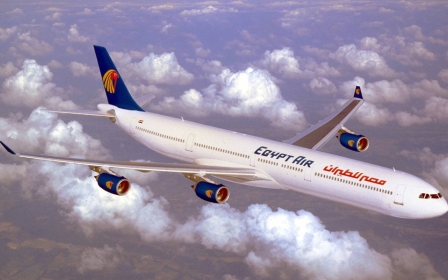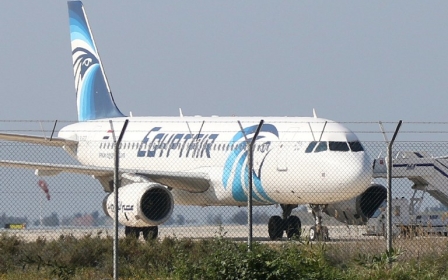France confirms missing Cairo-bound EgyptAir flight crashed into sea

An EgyptAir flight from Paris to Egypt crashed into the Mediterranean after disappearing overnight, the French president said on Thursday morning.
EgyptAir had initially denied any suggestion that a technical fault could be behind the plane's "disappearance," and would not confirm that it had crashed.
However, at a news conference in Paris on Thursday morning, French President Francois Hollande said that early indications were flight MS804 had crashed.
He said: "The information we have gathered - ministers, members of government, and of course, the Egyptian authorities - confirm, sadly, that is has crashed. It is lost."
The French president added that no hypothesis could be ruled out in the fate of the aircraft.
"We have also a duty to know everything about the causes of what has happened; no hypothesis should be ruled out or preferred," he said.
A Greek airport source said that the plane had crashed just off the Greek island of Karpathos, while the country's defence minister told a news conference on Thursday morning there were indications the aircraft made "sudden swerves" at 37,000 feet in Egyptian airspace.
In a statement published on Facebook, Egypt's foreign ministry said French Foreign Minister Jean-Marc Ayrault earlier expressed condolences over the EgyptAir plane "which came down this morning".
Both countries stressed the importance of "strong co-operation and communication in the coming period to discover why the plane came down," the statement said.
In a news conference on Thursday afternoon, the Egyptian aviation minister said investigators were not "ruling out that it was a terrorist attack or mechanical failure," as rescue operations focused on a section of the Mediterranean 100 miles north of the Egyptian coast.
Greek authorities are investigating reports that passengers on a civilian boat saw an "explosion in the sky" over the Mediterranean on Thursday night, the Greece correspondent of French newspaper Le Monde reported.
Following the claims, however, EgyptAir protested alleged "misinformation," saying that it was still too early to determine what exactly had happened.
Search-and-rescue operations jointly run by the Greeks and the Egyptians are underway with France announcing that it too would deploy planes and a ship to aid in the effort. An EgyptAir official said the search was focused on an area of the sea north of the Egyptian coast, without providing a precise location.
Vessels in seas near the area where the plane disappeared have been scrambled to assist with the search, according to ship-tracking website Marine Traffic, which published video of ships heading towards the search area.
With the reasons for the plane's disappearance still unknown, Tony Cable, a retired air accident expert who investigated the 1988 Lockerbie air disaster, told Middle East Eye that initial investigations would likely focus on security at Paris's Charles de Gaulle airport where the flight took off.
Security at the airport was already heightened, but had been tightened even further in recent months, following last November's Islamic State (IS) group-claimed attacks in Paris.
Soldiers are still on patrol at many French airports, but attention will no doubt now be focused on how effective more discreet security measures and screening have been. Security was boosted further in March in the wake of IS-claimed attacks in Belgium and an additional 40 French police officers were deployed to Charles de Gaulle.
Cable said investigators would focus on so-called “primary and secondary radar sources” to attempt to discover if the plane broke up in mid-air, which could suggest a catastrophic technical failure or an explosion.
"Like all investigations, the Egyptian and international authorities will start with the information they have available, and for now that will primarily be radar data and any messages from the aircraft,” Cable said.
'It's a real mystery'
Phil Giles, a former British investigator with the UK’s Air Accidents Investigation branch, said that “modern aircraft don’t just break up in the sky” and that the Airbus A320 had a “very good safety record".
He told MEE: “It’s a real mystery, but it sounds at this early stage that there could have been some kind of device, either placed on the plane earlier at another airport in some kind of Lockerbie situation or placed on board the plane at Paris, though security is very tight there already. We may see a focus on the air-side staff there in the coming hours and days."
The flight with 56 passengers, seven crew members and three security men aboard went missing overnight, according to the airline. Contact was lost at 2:45am Cairo time (0045 GMT), when the plane was just inside Egyptian airspace and at an altitude of 37,000 feet (11,000 metres).
Thirty Egyptians and 15 French were on board, along with nationals from Iraq, Britain, Belgium, Kuwait, Saudi Arabia, Sudan, Chad, Portugal, Algeria and Canada.
Emergency centres have been established at Paris's main airport, attended by representatives of the airline and the Egyptian embassy, and also at Cairo airport where relatives of the passengers had begun to gather. A MEE contributor in Cairo said that the families had begun to arrive in the early hours and had been taken to a nearby building which was being guarded by police.
French Foreign Minister Ayrault said a "crisis cell" had been established in the country's embassy in Cairo.
"We have begun to mobilise our resources and have made ourselves available to the Egyptian authorities - with military aircraft and vessels - to help in the search for this plane. But for the moment the priority is to support the families and we are at their disposition," he said.
The French government also set up a crisis number for those affected by the incident.
In what is believed to have been the last known contact with the plane, Greek air traffic controllers are reported to have spoken to the aircraft’s pilot over the island of Kea. He “did not mention any problems,” Kostas Litzerakis, a spokesperson for Greek’s civil aviation authority, told Reuters.
Conflicting reports
Greek civil aviation authorities said they had not received a distress signal from the plane, Le Monde reported.
Still, the airline told AFP that the plane sent a distress signal less than 10 minutes before vanishing from radar screens, but did not elaborate on its nature.
It also said a further distress call was sent out two hours after the plane is believed to have crashed, although this could have been an automated distress signal.
In a further twist, the Egyptian army has since denied detecting a distress signal from the plane.
France's Prime Minister Manuel Valls said on Thursday that "no theory can be ruled out".
President Francois Hollande called his Egyptian counterpart and the leaders agreed to "cooperate closely" to establish what happened to the plane.
Hollande also set up a crisis meeting of top ministers, including Valls, the foreign, defence and interior ministers, according to sources close to his Elysee office.
The flight from Paris Charles de Gaulle to Cairo normally takes just over four hours and the plane was due to arrive at 3:05am local time.
The Flightradar24 website said MS804 was an Airbus A320-232, and was delivered to the airline in 2003. The pilot reportedly had more than 6,000 hours worth of flight experience, while the co-pilot had 2,000. Skies were clear over that part of the flight path.
EgyptAir hit the headlines in March when a flight from Alexandria to Cairo was hijacked and forced to divert to Cyprus where an "unstable" hijacker demanded to see his ex-wife.
In October, IS claimed responsibility for bombing a Russian airliner carrying tourists from the Egyptian resort of Sharm el-Sheikh, killing all 224 people on board.
October's bombing hurt Egypt's tourism industry, with many airlines cancelling flights to the Red Sea resort over security concerns.
On Thursday, Egypt's stock market fell sharply amid renewed concerns about the country's already reeling economy and tourism sector.
New MEE newsletter: Jerusalem Dispatch
Sign up to get the latest insights and analysis on Israel-Palestine, alongside Turkey Unpacked and other MEE newsletters
Middle East Eye delivers independent and unrivalled coverage and analysis of the Middle East, North Africa and beyond. To learn more about republishing this content and the associated fees, please fill out this form. More about MEE can be found here.






